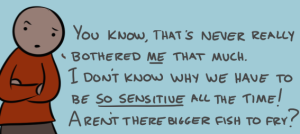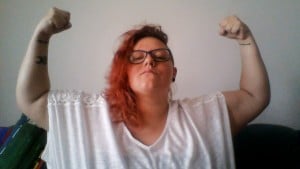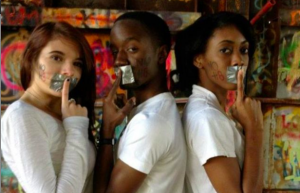
APNA
Zee, a television network in India, recently launched a new channel “Zindagi” (Life) that broadcasts hit Pakistani shows. The channel’s preview was pretty interesting, and the thought of seeing what kinds of TV programs run on the other side of the border made me excited enough to watch.
One of the shows on “Zindagi” is “Zindagi Gulzar Hai” (Life is a Garden of Flowers) about a young, lower-middle class girl who is offered a merit-based scholarship at an expensive college where she meets a rich, chauvinistic boy.
Although the show has good actors and decent dialogues, the extreme characterizations of the girl’s mother and the boy’s mother (among other things) were too much for me to endure.
The girl’s mother is shown as a nice person, a good mother, and a religious woman who covers her head when she goes out. She works as a principal at a school and struggles to make ends meet.
The boy’s mother, on the other hand, is shown as someone who is neither a good wife nor a good mother. She is rich and successful in her career, which apparently demands much traveling.
A scene in one of the earlier episodes shows the boy’s mother preparing to leave for a conference abroad. The boy, noticing his mother’s luggage, asks if she was going somewhere. Her reply is, “Even your father doesn’t question me like that.”
Who goes to another country without informing the people you live with? Who does that in real life? Who gets offended by “Hey, I see your luggage. Are you going somewhere?” Seriously.
But that’s how the writers chose to make this character behave.
Why? To reinforce the popular idea of how a rich, educated, and modern woman is. As viewers, we are encouraged to hate this woman for her arrogance, her drama, her unaccountability.
And this isn’t an isolated incident. Popular culture has a way of turning modern women into villains.
It not only equates women’s independence with arrogance and modernity with shamelessness, but also projects a highly educated woman to be inconsiderate and ill-mannered.
What message does this projection send? It tells a patriarchal society, “Look! This is what happens when you educate girls.”
Funny how you can be an arrogant man and your arrogance will not be blamed upon you being literate or illiterate. But women — education spoils women and modernity turns them into witches!
One might think that the writers of the show would be men, but the author of the novel upon which the show is based is a woman. So is the director of the show.
My intention in noting this is not to blame them, but to highlight that patriarchy is a playground for both men and women. Women aren’t automatically feminists simply because they are women.
Showing poor and lower-middle class women as “good” women while projecting educated, rich, and modern women as “bad” women is a trick used not just by patriarchal men, but also by women who benefit from patriarchy to keep other women from outgrowing societal limitations.
One example of this is women scrutinizing other women’s clothing as the cause of rape or harassment, and thus receiving “acceptance” in the form of a few male heads nodding, or Facebook likes and retweets. Their moral policing of other women places them on a pedestal of “purity” – the one thing the patriarchy cherishes in a woman.
“Zindagi Gulzar Hai” might have been a media hit for its portrayal of strong women from the struggling class, but it ends up being guilty of strengthening the good woman/bad woman dichotomy – the dichotomy that pits women against women.
The dichotomy that makes one set of women feel morally superior to another by suggesting that the woman who covers her head is better than the woman who likes experimenting with her hair, the woman who “saves” herself for her husband is better than the woman who is in a live-in relationship with her partner, and the woman who cooks and cleans for her family is better than the one who chooses not to have children.
Any kind of liberation arising out of such discourse will be shallow. How can women be truly liberated when one set is eyeing to be patriarchy’s ideal woman and denouncing the other as “sluts” in the process?
I am amazed at how many Indian films are based on this one story line: A married couple’s happy life falls apart when a new woman enters the husband’s life — as his new secretary at office, as a friend of a friend, as a co-member at a sports club.
This new woman (who will soon become a home wrecker) is invariably shown as highly modern, ambitious, educated, and often rich — all elements that make up a “bad” woman.
The husband is tempted to be with this short skirt-wearing, English-speaking, and wine-drinking lady as opposed to his wife who cooks and cleans, and waits for him to come home from work.
By the end of the film, the “other” woman either dies or leaves, losing the tug of war between herself and the good wife.
Pop culture has countless examples of female roles that have been created to feed into the popular idea of what a highly modern, educated and independent woman is like – arrogant, inconsiderate, and ill-mannered – as opposed to a modest, selfless, and well-mannered traditional woman.
While the modern woman often repents, fails, or dies, the traditional or semi-modern woman is rewarded with a happy ending.
The message is loud and clear: You will be accepted as an educated woman if you stay within the limits of the society’s patriarchal ideology and are a passive recipient of the rights given to you by the men and women who benefit from the patriarchy.
Perhaps the patriarchy has figured out that the best way to subjugate women in the 21st century is by making them look down upon each other and fight among themselves.
Otherwise, it risks an upheaval of the society by an all-encompassing sisterhood.
If we want to change how society perceives women and how popular culture treats them, then we must get rid of the categories and dichotomies that confine us and degrade us.
Here are a few simple ways that a good girl/bad girl dichotomy is created in society and in popular culture:
1. ‘Good Girl’ Compliments
There’s a quote from musician Pete Wentz that has been making its rounds on the Internet for a few years now: “Girls are like apples…the best ones are at the top of the trees. The boys don’t want to reach for the good ones…instead they just get the rotten apples that are on the ground that aren’t as good, but easy.”
It’s time the world knew that women are not apples and no woman is “rotten.” It’s time we stopped telling women that the worst thing to be likened to is other women.
You hear it all the time in pop culture. The “you’re not like other girls” line, meant to compliment the “good” woman and reinforce the good woman/bad woman dichotomy.
But it’s not a compliment if it works by putting down other women. It’s just a way to keep us playing the game patriarchy wants us to play.
The next time you hear a lyric, or watch a character, or witness a real life person say that a woman “isn’t like other girls,” call it out. Don’t let them get away with it.
2. Labeling Women with Rich Partners as ‘Gold Diggers’
Most offensive labels in society and in popular culture are reserved for women. If a woman approaches a man because he’s rich, she’s labeled a “gold digger.” But what about the man who approaches a woman because she is beautiful?
In movies, we see and accept a male character falling in love at first sight with a beautiful woman all the time, but we object to a female character’s sudden interest in a man after she finds out how rich he is.
But how is her beauty any different from his money? Both are equally superficial, and neither forms the core of authentic love.
“Gold digger” is just another way we villainize women, and we need to stop it — in real life, as well as in movies.
3. Implying that Women Aren’t or Can’t Be Sexual
While men are socially entitled to enjoy (and often to demand) sex, women who enjoy sex are shamed and labelled as “sluts.”
Acknowledging women as sexual beings means rejecting misogynist categorization of women on the basis of their sexual behavior. There is no Madonna and no whore. The woman a man wants to take home to his mother and the woman he wants to fantasize about are different only in his mind.
Know that women are not gatekeepers of morality and sexuality. We are free to enjoy sex as much as men do. We don’t need to be prude if we don’t want to be.
4. Lack of Complexity
Popular culture loves to play Santa Claus and decide which women have been “good” and which ones have been “bad.”
And it’s this good woman/bad woman dichotomy we see in pop culture that leads to the same dichotomy in society, with people writing off certain women and propping up others as idols.
But that model is far too simple. Women aren’t playing cards to sort into the proper deck. They are complicated people with lives and ambitions. Can we let women just be themselves and deal with their life situations without being judged?
I want to see the “good” woman get an abortion in a movie instead of the “bad” woman because in real life the women whom we know have got abortions are amazing women.
I would like to see the “good” woman act moody, busy, self-obsessed, jealous, career-oriented, assertive, independent, sexually forward with no “daddy issues” — all this without being labelled a “good girl gone bad.”
We need feminist filmmakers and popular artists to tell the truth of how women really live their lives, instead of trying to tell them how they ought to live.
***
Since real change can authentically begin only from inside of all of us, we must change the way we treat ourselves and other women.
Every time we feel righteous about our way of life as compared to another woman’s way of life, we must find out whether that righteousness is sowed in that special form of misogyny characterized by women hating women.
Shedding light on our own social conditioning is the biggest favor we’ll do ourselves. When our social conditioning loses its strength with regular self-reflection, we begin to honor ourselves and other women.
By honoring each other, we come together to form that all-encompassing sisterhood against which patriarchy and misogyny don’t stand a chance.
[do_widget id=”text-101″]
R. Nithya lives in New Delhi, India. She has a Bachelor’s in Journalism and a Master’s in Political Science and has worked as a reporter with an online political news and analysis magazine. She enjoys reading books while traveling on the metro, writing poetry on sleepless nights, and engaging in conversations on politics, feminism, and spirituality. These days she is practicing patience and presence. Visit her here or follow her on Twitter @rnithya26.
Search our 3000+ articles!
Read our articles about:
Our online racial justice training
Used by hundreds of universities, non-profits, and businesses.
Click to learn more




















